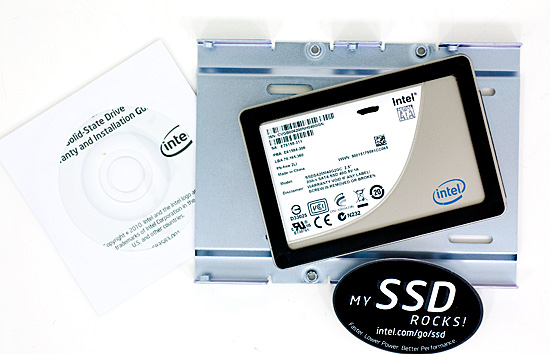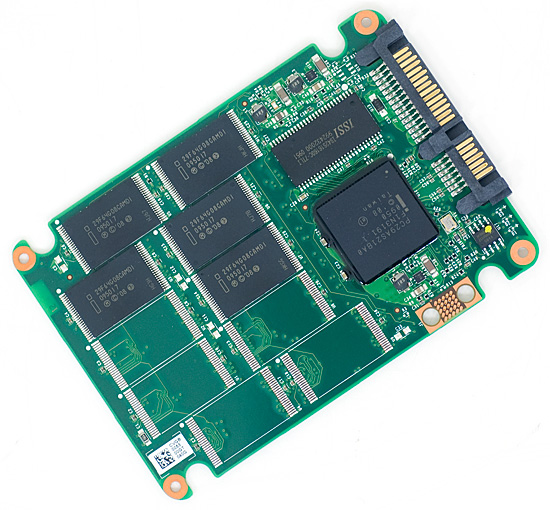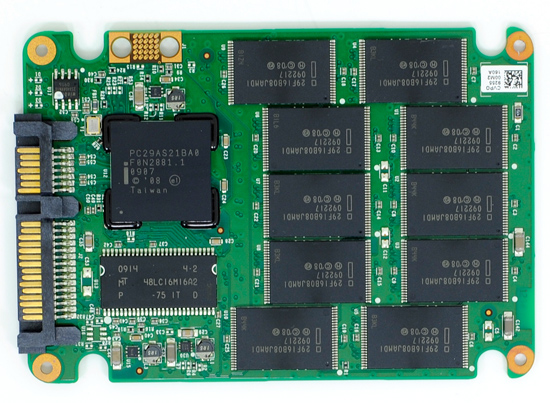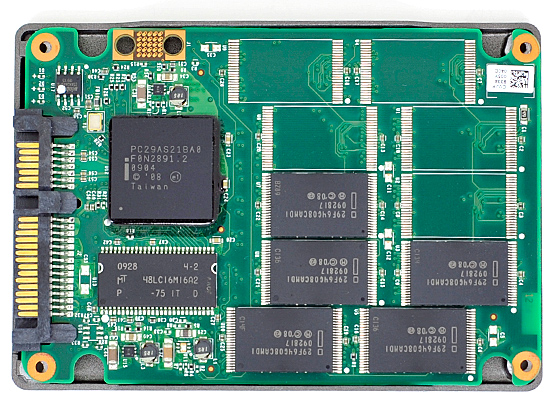Intel's X25-V & Kingston's 30GB SSDNow V Series: Battle of the $125 SSDs
by Anand Lal Shimpi on March 19, 2010 12:00 AM EST- Posted in
- Storage
V for Vende...Value
This is the first time I’ve actually received a retail boxed Intel SSD. The packaging actually mimics that of Intel’s boxed CPUs:

Inside the retail package you’ll find a full upgrade kit. You get a 3.5” mounting plate, a mini CD with an installation guide on it, one of those My SSD Rocks! stickers and the drive itself.

The X25-V ships in the same aluminum housing as the X25-M G2. Cracking it open reveals a bare side of the PCB:

Flipping it over we see the 5 x 8GB 34nm IMFT flash modules, the G2 controller and 32MB of PC133 SDRAM. The controller and SDRAM size/speed are identical to the 80 and 160GB G2s we reviewed last year.

Intel's X25-V PCB
With only half the channels populated, sequential write speed is about half of the X25-M G2 (~40MB/s vs. ~80MB/s). Remember that Intel’s controller uses free space as spare area, so with potentially less free space on the drive the 40GB X25-V will undoubtedly perform much worse than the 80GB or 160GB X25-Ms.

Intel's X25-M G2 PCB
In practice, the X25-V should perform very much like last year’s 40GB Kingston V Series Boot Drive. The two are identical minus official support for TRIM in the X25-V’s firmware.

Kingston's 40GB V Series Boot Drive PCB
Intel’s storage drivers (Intel RST 9.6) with TRIM support are expected to be available any day now so you’ll no longer have to rely on Microsoft’s AHCI drivers for TRIM.










78 Comments
View All Comments
davepermen - Friday, March 19, 2010 - link
technically, still more expensive than the intel 40gb at 125$ (per gb), but yeah, others than just kingston and intel should be listed.still i'm glad for the 33% more storage :)
buzznut - Monday, March 22, 2010 - link
Yeah, this is the decision I made when buying my 40gig. With a win7 install those 10gb make a huge difference. For an entry level SSD, I would recommend the Intel over the OCZ despite some performance differences. Especially when it comes to gaming.Choosing between the Kingston drive and Intel at the time was a no-brainer.
However I would/will look at OCZ vertex series when going to 60GB or higher capacity.
mmntech - Friday, March 19, 2010 - link
It's progress in the right direction though. Wasn't long ago when these small drives were $200-$300. Still, I'm going to wait until 80gb SSDs drop to around that price. More breathing room. Still way too small for laptop use too.vol7ron - Friday, March 19, 2010 - link
I'd like to see the 80GB/160GBs fall in price too. Once they do, I'll consume =]MadMan007 - Friday, March 19, 2010 - link
When you talk about capacities in the chart on page 4 I take it the formatted capacity is in gigabytes (GB) and not gibibytes (GiB). So on top of reserved flash there is also the GB-GiB conversion to account for?gaspard - Friday, March 19, 2010 - link
Harddrives are measured in Gigabytes (1 billion bytes), Operating systems (Windows for example) usually measure in Gibibytes... aka 1024 times 1024 times 1024 = 1,073,741,824 bytesMadMan007 - Friday, March 19, 2010 - link
Thanks bro but that didn't add or clarify anything about my question. The fact that HDs use GB and OSes use GiB was implicit background knowledge for my post. I see Jarrod made a guess but I'd still be interested to know whether the chart on page 4 for formatted capacities especially and others just for funsies is in GB or GiB.JarredWalton - Friday, March 19, 2010 - link
And flash chips are generally measured in GiB as well (or at least, the chips come in powers of 2). I think part of this is SSD makers figure they'll use the GiB vs. GB difference to make up for their spare area. So you can have 7.3% spare area and your 40GiB SSD ends up formatting to the same size as a 40GB HDD. Just a thought.GullLars - Friday, March 19, 2010 - link
This was a good test, and one i've been waiting for a while. I'm a bit disappointed a 32GB Indilinx Barefoot drive wasn't included. I have a 30GB Vertex in my laptop that performs better sequentailly than these numbers, and has better random performance than the Kingston V 30GB. The price is slightly higher though.Ref screenshot: http://www.diskusjon.no/index.php?app=core&mod...">http://www.diskusjon.no/index.php?app=c...h_rel_mo... CDM 3.0 + WEI for my laptop.
Now the next thing I hope Anandtech will do regarding SSDs is a comparison of RAID of low-capasity cheap SSDs VS single high capasity SSDs. This is something no other reckognized tech site has done yet, but enthusiasts have done for years now. Example: http://www.nextlevelhardware.com/storage/battleshi...">http://www.nextlevelhardware.com/storage/battleshi...
I'll also mention Nizzen, an enthusiast on a forum i frequent, who set a WR i PCmark vantage last spring with his 24/7 setup, and is still on top5 with the same setup (updated in august with 4GB RAM on the Areca). The key was an Areca 1680ix-12 with a RAID-0 of several (7 i think) OCZ Vertex.
ORB result page: http://service.futuremark.com/resultComparison.act...">http://service.futuremark.com/resultCom...sultId=2...
24740 PCmarks, WAY ahead of the highest score in your benchmark lists. The same level of disk performance is possible to get with an LSI 9211-8i with 8 30-40GB SSDs in RAID-0 for about $1000 (less than 2 256GB SSDs).
Suggested lineup for such an article: RAID-0 of 4 Kingston V 30GB, Intel x25-V, and Indilinx Barefoot 32GB (Vertex?). 2 RAID-0 SF-1200/1500 50GB, Kingston SSDNow V+ 64GB, Indilinx Barefoot 64GB, Intel x25-M 80GB. And single 100/128/160 GB SSDs of various controllers.
Regarding performance degrading in RAID whitout TRIM, increased reserved area can help negate the performance degrading (Ref IDF whitepaper on spare area). Increasing the spare area to ~20-25% from the default 7% (on most SSDs) will make sure degrading will not be noticable by users in normale usage models.
strikeback03 - Friday, March 19, 2010 - link
So how much faster were program loads and other useful things with that super RAID array?